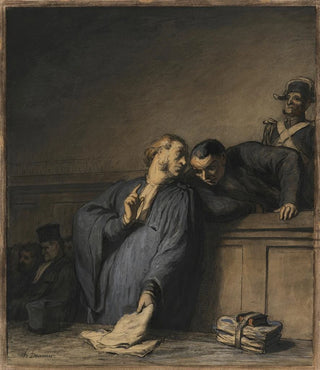Art print | A Criminal Case - Honoré Daumier


View from behind

Frame (optional)
In the rich and complex panorama of art history, some works stand out for their ability to capture moments of truth, to reveal social realities with striking acuity. "Une affaire criminelle" by Honoré Daumier is one of these emblematic creations, a painting that immerses the viewer in the depths of a society in full transformation. Created in the 19th century, this piece is much more than a simple visual representation; it is a mirror of the political tensions and injustices that prevailed at the time. Through this art print, the gaze is drawn to figures that seem to live a human tragedy, inviting deep reflection on the human condition and the flaws of justice.
Style and uniqueness of the work
Honoré Daumier's style is characterized by a realistic and expressive approach, where each brushstroke appears charged with emotion. In "Une affaire criminelle," the composition is carefully thought out, with each character occupying a strategic position that enhances the drama of the scene. The faces are marked by poignant expressions, revealing suffering, fear, and anxiety. Daumier excels in the art of making the invisible visible, capturing the nuances of human emotions within a troubled social context. The colors, often dark and earthy, emphasize the heavy atmosphere of the piece, creating a palpable tension that grips the viewer. This painting is a true character study, where each figure tells a story, and every gesture is loaded with meaning. The artist's mastery in handling shadows and lights reinforces this sense of depth, transforming the canvas into a lively scene that provokes and moves.
The artist and his influence
Honoré Daumier, a major figure of the realist movement, skillfully combined his artistic talent with a profound social commitment. An engaged artist, he used his art as a means of denunciation, addressing themes such as justice, politics, and the working class condition. His influence extends far beyond his era, inspiring many artists who followed in his footsteps. Through his work, Daumier reminds us that art can be a powerful vehicle for change, capable of inspiring reflection.

Matte finish

View from behind

Frame (optional)
In the rich and complex panorama of art history, some works stand out for their ability to capture moments of truth, to reveal social realities with striking acuity. "Une affaire criminelle" by Honoré Daumier is one of these emblematic creations, a painting that immerses the viewer in the depths of a society in full transformation. Created in the 19th century, this piece is much more than a simple visual representation; it is a mirror of the political tensions and injustices that prevailed at the time. Through this art print, the gaze is drawn to figures that seem to live a human tragedy, inviting deep reflection on the human condition and the flaws of justice.
Style and uniqueness of the work
Honoré Daumier's style is characterized by a realistic and expressive approach, where each brushstroke appears charged with emotion. In "Une affaire criminelle," the composition is carefully thought out, with each character occupying a strategic position that enhances the drama of the scene. The faces are marked by poignant expressions, revealing suffering, fear, and anxiety. Daumier excels in the art of making the invisible visible, capturing the nuances of human emotions within a troubled social context. The colors, often dark and earthy, emphasize the heavy atmosphere of the piece, creating a palpable tension that grips the viewer. This painting is a true character study, where each figure tells a story, and every gesture is loaded with meaning. The artist's mastery in handling shadows and lights reinforces this sense of depth, transforming the canvas into a lively scene that provokes and moves.
The artist and his influence
Honoré Daumier, a major figure of the realist movement, skillfully combined his artistic talent with a profound social commitment. An engaged artist, he used his art as a means of denunciation, addressing themes such as justice, politics, and the working class condition. His influence extends far beyond his era, inspiring many artists who followed in his footsteps. Through his work, Daumier reminds us that art can be a powerful vehicle for change, capable of inspiring reflection.






